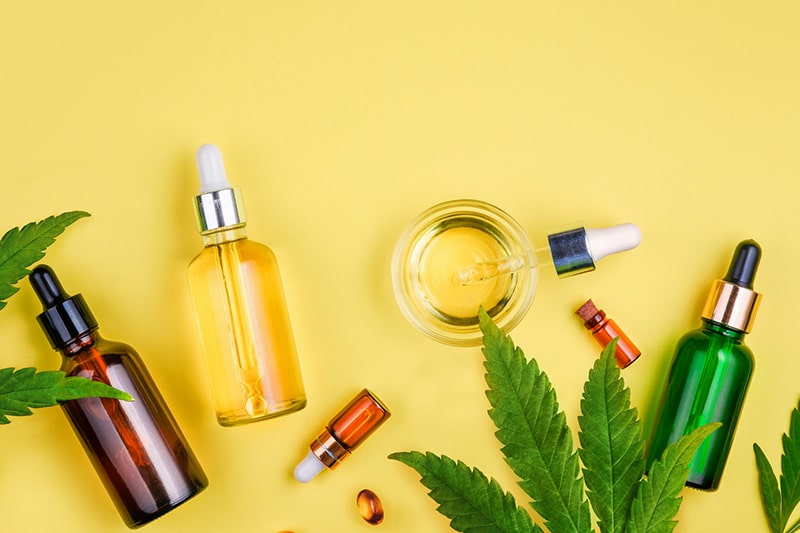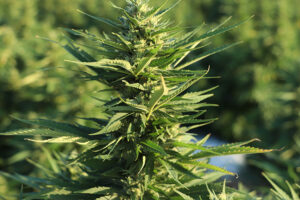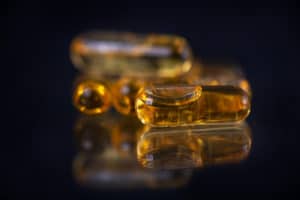Have you experienced a prolonged period of fatigue after recovering from a virus or bacterial infection?
If so, you might have chronic fatigue syndrome (CFS). Also known as myalgic encephalomyelitis (ME), this syndrome is often abbreviated to ME/CFS. This debilitating condition affects around 2.5 million US citizens.
ME/CFS can zap your energy so badly that you’re rendered housebound or even bedridden.
Your energy levels become so low that’s it’s hard to do even simple daily tasks like showering or preparing a meal.
Many people find CBD oil is effective at relieving symptoms of pain and insomnia. Could it also be useful for chronic fatigue?
See all CBD oil benefits here.
Cannabis is a name that refers to a group of plants including marijuana and hemp. These plants contain compounds called cannabinoids, including THC and CBD.
Marijuana is a type of cannabis plant that’s bred to contain higher concentrations of the psychoactive chemical THC. Psychoactive substances are anything that changes the chemical make-up of the brain. For example, caffeine is considered a psychoactive substance. So is marijuana.
Hemp, on the other hand, has high levels of CBD, but only traces of THC. As such, hemp is not psychoactive and may have calming properties.
CBD is also shown to be effective in reducing anxiety, inflammation, pain, and insomnia. This is due to the anxiolytic effect it has on the central nervous system.
What Is Chronic Fatigue Syndrome?
Myalgic encephalomyelitis or chronic fatigue syndrome (ME/CFS) is recognized by the World Health Organization and the CDC as a brain disorder and a disease of the central nervous system.
The symptoms of ME/CFS are wide-ranging. In addition to feeling chronically tired, sufferers report other common symptoms, including:
- Muscle Pain
- Joint Pain
- Headaches
- Insomnia
- Sore Throat
- Brain Fog
- Dizziness
- Nausea
- Irregular Heartbeat
It’s not completely understood what causes ME/CFS, but it occurs predominantly in adults aged 20 to 45. Women are three times more likely than men to suffer from chronic fatigue syndrome.
Diagnosing ME/CFS is tricky as the symptoms often overlap with other conditions. Diagnosis is based on symptoms, blood, and urine tests.
Many people don’t realize how debilitating ME/CFS can be. Not only are the symptoms physical – muscle pain, balance problems, fatigue – but they’re also mental. People who suffer from ME/CFS often complain of brain fog, a short attention span, and being unable to focus.
Many people can eventually recover from ME/CFS, but others end up bed-bound or using a wheelchair.
What Causes CFS/ME?
The cause of chronic fatigue syndrome is not fully understood. However, some theories suggest it could be triggered by any of the following:
- Emotional Trauma
- Viruses
- Bacterial Infections Like Pneumonia
- Immunity Problems
- Hormone Imbalance
- Genetics
While the triggers are not fully understood, ME/CFS seems to be the result of an inflammatory response. The body believes it is under attack, and so starts to fight back against this imaginary enemy.
So what can you do if you’re diagnosed with this chronic condition?
Treatment of CFS/ME
Typically, the treatment of ME/CFS involves a combination of cognitive behavioral therapy, a gentle exercise program, and pain medication. This approach can help manage symptoms. There’s no medication specifically prescribed for ME/CFS, and there is no cure.
How Can CBD Help with Symptoms of ME/CFS?
There’s a significant body of research that shows CBD oil can effectively relieve a range of ailments, including:
- Pain
- insomnia
- Epilepsy
- Anxiety
- Seizures
The cannabinoids in CBD oil have anti-inflammatory properties. As sufferers of ME/CFS endure symptoms of neuro-inflammation much like sufferers of multiple sclerosis, they can find relief by taking CBD oil.
Is CBD Safe?
The World Health Organization says that CBD oil is safe and well-tolerated at high doses. The WHO also suggests that any side effects experienced are most likely caused by interactions between CBD and other medications rather than due to CBD itself.
CBD and Endocannabinoids
So, how does CBD relieve the pain and symptoms of ME/CFS?
Cannabinoids are compounds found in plants. There are 113 known cannabinoids in the cannabis plant, which target the endocannabinoid receptors in the brain and central nervous system. The endocannabinoid system works to help maintain homeostasis in the functions of the nervous system like sleep, pain, stress, and hunger.
When the endocannabinoid system is out of balance, this is known as clinical endocannabinoid deficiency (CECD). This can lead to illnesses such as fibromyalgia, chronic fatigue, and irritable bowel syndrome.
Clinical endocannabinoid deficiency can be caused by poor diet, lack of exercise, and environmental toxins. Prolonged periods of stress put strain on the endocannabinoid system. Over time, this can impact a range of physiological processes, and cause illness due to an inability to respond to this chronic stress.
There’s overwhelming evidence to suggest CBD could be an effective alternative medicine for ailments such as chronic pain and epilepsy. In fact, it has been shown to be 100% effective at stopping epileptic seizures where other epilepsy drugs have failed.
When cannabinoids enter the central nervous system, the cannabinoids act as a key and unlock the receptors in your body. This releases an analgesic effect, which is why many people take CBD oil to relieve chronic pain. CBD is an outstanding pain-relief choice as it has been found to have no side effects whatsoever.
How to Keep the Endocannabinoid System Balanced
To stay healthy and keep your endocannabinoid system balanced, you can follow some general health guidelines and best practices. Eat a diet rich in fresh fruit and vegetables and cut out processed foods as much as possible. Try to keep your sugar intake down.
Eat plenty of healthy fats, as these support the endocannabinoid system. You can get these fats from avocado, and from oily fish like salmon, mackerel, and tuna. If you’re not comfortable eating salmon or tuna due to pollution levels in the sea, you can also get healthy fats from nuts and seeds. Just two Brazil nuts a day will give you all the selenium you need.
How to Take CBD for Chronic Fatigue Syndrome
CBD is versatile and can be taken in different ways. The dosage and the delivery method you use depends on your personal preference.
Be sure to consider the bioavailability of the method you use. Bioavailability is the effectiveness of a substance when it’s absorbed in the body. The higher the bioavailability, the higher the effectiveness and potency.
It’s advisable to start with a lower dose of CBD and gradually increase it. As ME/CFS is a chronic condition, you should keep taking CBD regularly for the best results.
Ways to Take CBD Oil
How you take CBD oil influences its potency and how long it takes to kick in. Generally, if you ingest CBD in capsules or edibles, it takes longer to work and is less potent than dabbing or vaping (more on those directly below.)
Smoking
Research overwhelmingly indicates that smoking or vaporizing cannabis is effective at relieving chronic pain. This is great news for people who could otherwise end up dependent on opioid painkillers. However, smoking can irritate your lungs, so it may not be appropriate for everyone.
Dabbing
Dabbing is becoming increasingly popular thanks to hip-hop culture popularizing dab rigs and wax. This delivery system involves vaporizing concentrated CBD oil before inhaling. The effects are strong and fast-acting. You’ll get a near-instant hit.
Sublingually
A popular way to administer CBD oil is by dissolving it under the tongue. This method works much quicker than ingesting CBD, as it enters the bloodstream from the soft tissue in the cheek and under the tongue.
It should take no more than 10 minutes for CBD to take effect when you use it sublingually.
Oral Ingestion
You can swallow CBD oil in the form of capsules, gummy bears, brownies, or even drops of oil.
The issue here is that you must wait for the edible or oil to travel to your digestive tract where it’s absorbed. Ingesting CBD oil, capsules, or edibles means it will take 20 to 60 minutes to take effect.
Topical
CBD oil can be applied as a balm, cream, lubricant, or salve. Topical application is useful if you have painful joints or other aching areas on your body.
When used topically, CBD doesn’t enter the bloodstream like other methods. Instead, it reacts with receptors in your skin. When applying CBD topically, you are free to apply it as often as you like.
Suppositories
If you want your CBD to act faster, you can consider suppositories that can be inserted into the rectum or vagina. Like sublingual ingestion, suppositories take around 10 to 15 minutes to take effect.
Getting The Best Bioavailability
For quick powerful relief, use methods that act more quickly and powerfully. Studies show that smoking or dabbing maximizes bioavailability more effectively than ingesting.
Take it regularly
It takes some time for the effects of CBD to build up, so you may need to take it for a few weeks before you start to feel the effects.
If you’ve been struggling with ME/CFS for a while, keep taking CBD regularly for it to continue working.
Full Spectrum vs CBD Isolate Powder
If you’re worried about drug tests at work, play it safe by using CBD isolate powder rather than full-spectrum CBD.
Full-spectrum CBD contains tiny amounts of THC and other cannabinoids. The relative youth of the industry means that enforcement of standards in the CBD product industry is still in its infancy, too. That means you run the risk that full-spectrum CBD could contain enough THC to show up on a drug test.
CBD isolate, on the other hand, contains only CBD and no THC, so you’ll be completely safe if you have to take a drug test. Always make sure the product you’re considering has been tested for THC.
The downside of choosing CBD isolate is that you’ll miss out on the entourage effect. This is where all the nutrients, terpenes, and cannabinoids work together to create even more concentrated health effects.
Dosing
Since CBD is relatively new to being used for medical purposes, there are no hard-and-fast dosage guidelines. It’s always best to start with a low dose and gradually increase it until you get the desired effect.
Although no one has ever overdosed on CBD oil, it is generally not recommended to exceed 1000mg a day.
Cannabis as a Treatment for ME/CFS
There is a serious lack of research into the effectiveness of CBD’s ability to reduce symptoms of ME/CFS. However, some studies have found that it’s effective when used to treat fibromyalgia, which has some symptoms that overlap with ME/CFS.
THC or CBD for Treating Chronic Fatigue Syndrome?
If you’re not concerned about upcoming drug tests at work, you may get more health benefits from full-spectrum CBD rather than CBD isolate. Full-spectrum CBD has small amounts of THC, which has more anti-inflammatory properties than CBD.
On a molecular level, THC and CBD are almost identical. The slight but important difference is that THC gets you high. However, the amount of THC in full-spectrum CBD is not enough to get you high.
Note that THC can aggravate psychotic symptoms in people who struggle with mental health disorders like schizophrenia and paranoid mood disorders. CBD has no psychoactive effects whatsoever, so it is considered safe for people with a mental illness.
Side Effects of CBD for Chronic Fatigue
While many people enjoy considerable relief from using CBD to relieve symptoms of chronic fatigue syndrome, some experience negative side effects.
Some people report a type of hangover the day after using CBD treat ME/CFS. Others suffer from diarrhea and vomiting.
Starting with a low dose of CBD and gradually increasing the dose should help avoid side effects.
Final Thoughts
If you’re suffering from ME/CFS, you want to achieve as much balance in your central nervous system as possible.
Following a healthy diet full of fruit, vegetables, and healthy fats will help maintain homeostasis in the endocannabinoid system. Other foods known to be effective in reducing inflammation and boosting immunity include ginger and curcumin.
You could also consider adaptogen supplements such as ashwagandha, Siberian ginseng, or Panax ginseng.
For some immediate relief, you can try dabbing or vaping CBD. It’s best to purchase CBD oil from a reputable company that tests its products accurately for any traces of THC.
If you’re not comfortable with dabbing or vaping, you could try ingesting CBD by eating edibles, swallowing CBD oil capsules, or placing a drop of oil under your tongue. Topical CBD cream can provide pain relief directly where you apply it.
It’s possible to control ME/CFS and even recover eventually. Don’t lose hope that you will always be suffering from these debilitating levels of fatigue.
Many people have regained their health dealing with emotional trauma through cognitive behavioral therapy, a gentle exercise program, and pain medications where necessary. The trick is to be consistent, and above all, be kind to yourself.
Gaining control of stress levels is a pivotal part of recovering from ME/CFS, so you may want to practice some stress management techniques. Exercise also helps with stress relief. Avoid alcohol or substances that can hinder your progress.
If you have any questions about CBD for chronic fatigue or you need any help at all, don’t hesitate to get in touch. Bookmark our site before you go and come back soon!
FAQs About CBD For Chronic Fatigue
Question: How can CBD help with symptoms of Chronic fatigue syndrome (CFS)?
Answer: CBD can help in alleviating pain, insomnia, anxiety, and seizures that are some symptoms of CFS.
Question: Is CBD safe to consume for Chronic fatigue syndrome?
Answer: The World Health Organization says that CBD oil is safe and well-tolerated at high doses. The WHO also suggests that any side effects experienced are most likely caused by interactions between CBD and other medications rather than due to CBD itself.
Question: What are the cause of endocannabinoid deficiency?
Answer: Clinical endocannabinoid deficiency can be caused by poor diet, lack of exercise, and environmental toxins. Prolonged periods of stress put strain on the endocannabinoid system. Over time, this can impact a range of physiological processes, and cause illness due to an inability to respond to this chronic stress.
Question: How to Take CBD for Chronic Fatigue Syndrome?
Answer: There are many delivery methods that you can use such as using tinctures, supplements, topicals, and edibles. The dosage and the delivery method you use depends on your personal preference.
Question: How to get the best bioavailability from CBD?
Answer: For quick powerful relief, use methods that act more quickly and powerfully. Studies show that smoking or dabbing maximizes bioavailability more effectively than ingesting.
Question: Which is better between THC and CBD for chronic fatigue syndrome (CFS)?
Answer: THC could be slightly better than CBD because it has more anti-inflammatory effects. Note that THC can aggravate psychotic symptoms in people who struggle with mental health disorders like schizophrenia and paranoid mood disorders. CBD has no psychoactive effects whatsoever, so it is considered safe for people with a mental illness.
Question: What are the side effects of CBD for chronic fatigue syndrome (CFS)?
Answer: Some people report a type of hangover the day after using CBD treat ME/CFS. Others suffer from diarrhea and vomiting. Starting with a low dose of CBD and gradually increasing the dose should help avoid side effects.









